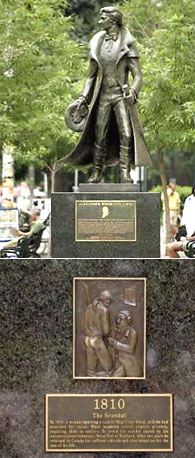Activists hail Taiwan High Court ruling on lesbian radio programme
Sister Radio Station, the nation's sole female-oriented broadcast media network, was fined last June by the GIO for violating programming content decency regulations during its 14 February airing of the radio programme, Lez Radio.
The government agency accused the radio station, which reaches audiences in Yunlin, Chiayi and Tainan counties, of having "adversely affected good social customs" with its imitation of sexual noises, which violated the decency provision in the Cable Radio and Television Law. The station was fined NT$9,000 (US$287).
The show's host, "Wei Wei," however defended the programme which discussed the use of condoms in lesbian sex. She also imitated sexual noises made by actresses in foreign and local movies meant to help debunk the myth that lesbian sex must be silent.
The network appealed the fine and won the case on Monday.
The radio station and gay rights advocates said the verdict showed a strong defence of freedom of speech and expression.
"This is not only a victory for the Sister Radio Station (FM105.7), but also a big victory for free speech in Taiwan," Sister Radio chairwoman and founder Wang Li-ping said yesterday. "I think the verdict is a win-win situation for all of the people in the country."
POST/READ COMMENTS
Thousands attend Tel Aviv Gay Pride amid heavy security measures
Tens of thousands participated in the eighth annual Tel Aviv Gay Pride parade last Friday afternoon.
The colourful parade, which set out from Rabin Square and onto Ibn Gvirol Street, and ended in Yarkon Park, where musicians performed, was held under heavy security arrangements, involving some 1,000 police, security guards and rescue teams.
The parade celebrated 30 years since the founding of the Society for Protection of Personal Rights for Lesbians, Gay Men and Bisexuals in Israel, and honoured the pioneers who fought the way for acceptance.
The chairman of the National Association of Gay Men, Lesbians, Bisexuals and Transgender in Israel, Mike Hamel, said in an interview to Israel Radio: "It's great to see it, and great that it's one of the few places in the world that has the support of a municipal body, a government body."
Referring to the term "pride parade," he explained that it is about "being proud of the way we are and the demand to accept every person as a person, as he is, and not trying to change him."
Hamel said the international gay pride parade would take place in Jerusalem next year. The heads of Jerusalem's gay community decided earlier this year to postpone the parade, which was slated to take place this summer, citing difficulties with timing due to the August withdrawal from the Gaza Strip.
Statue of one of Canada's first openly gay public figures raises controversy
A statue commemorating a hero of Toronto's gay community has become the cause of concern both for the actions of the man it depicts and for the somewhat graphic description of the 19th-Century sex scandal that made him famous.

Having emigrated from Scotland in the 1790s, he established himself as one of Toronto's leading merchants and was appointed as a city magistrate in 1800.
He became the centre of a gay sex scandal 10 years later when he was accused by several young men of fondling them during a rape investigation.
A woman who claimed to have been attacked by a group of men told Wood she had scratched the penis one of the assailant, so Wood took it upon himself to investigate the suspects' genitals.
After word of the incident got around, Wood was widely branded a "molly," a derogatory term for homosexuals, and he agreed to leave town in order to avoid potential sodomy charges. At the time, homosexuality was an offence punishable by death.
Wood fled to Scotland and returned to Canada two years later, without charge.
In 1827, Wood purchased a parcel of land in what is now Toronto's gay neighbourhood.
The incident is commemorated on the statue's granite base, with a bronze plaque depicting a man's rear-end with his pants around his knees, and Wood's outstretched hand in mid-examination.
"Let's get something straight: Alexander Wood wasn't a hero, he was a pervert," columnist Rachel Marsden wrote in the conservative National Post newspaper, noting that the bronze plaque was "something that could pass for a scene out of the Michael Jackson trial."
However, backers of the monument say Wood is an important link to the area's colourful history and the plaque is unlikely to offend many in an area where public displays of affection between same-sex partners are commonplace.
Kyle Rae, a gay Toronto city councilor disagrees with her views. "(The statue) is an important lesson to show people that there has been prejudice and homophobia historically. Often queer youth don't understand the struggle it took to get to where we are today."
The statue cost C$200,000 ($160,000), split between public funds and a local business development group. It sits just at the south end of the main gay village on Church St., a street lined with coffee shops, bars, and emblematic rainbow flags.
POST/READ COMMENTS












 打印版本
打印版本










读者回应
抢先发表第一个回应吧!
请先登入再使用此功能。